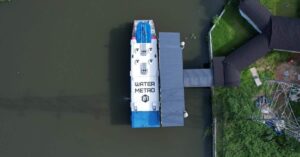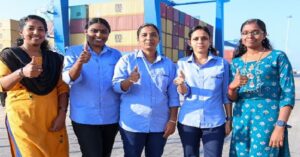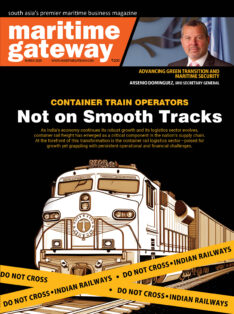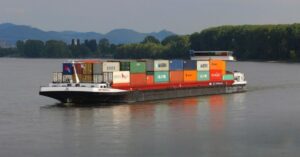Kuehne+Nagel has been in India for over 25 years. So, how has been the experience and how important is this region for Kuehne+Nagel?
Kuehne+Nagel globally, as many know, is one of the leading logistics providers and we are over 150 years old as a company. We originated from Germany and have our head office today in Switzerland and we developed from a traditional forwarder with air freight and sea freight operations to an end-to-end logistics provider where we aim at having solutions for specific industries, because industries require specific solutions which cater to their needs. In India, we have kind of followed the same sequence. So, we started in 1997 with a traditional C&F freight operations but we quickly evolved into a logistics provider with a strong presence, both internationally and domestically with warehouse and transport distribution solutions. And Asia specific, in general realm, is becoming more and more important for the global group and India, behind China and Vietnam is an important country for net growth.
Can you focus a little bit more on India and what kind of volumes Kuehne+Nagel has been handling in this region and also the business segments that you are servicing?
As you mentioned before, we are celebrating our 25th anniversary this year. We are of course part of the integral air freight and sea freight network of Kuehne+Nagel globally. If you look at the Indian focus, if you look at the business we do, the focus in really on the Europe, US, and China trade lanes, although it is fair to say that we expect a strong growth in inter-Asia business. From an industry perspective, Hi-tech, pharma, aviation and automotive are the main industries where we are busy. From a domestic point of view, you can say that our main activities are focused on the pharma, automotive and E-commercebusiness. Of course, the pandemic has shown a strong growth from a volume point of view.
Are there any unique services that Kuehne+Nagel provides for its customers and what are the benefits that customers can expect when they engage Kuehne+Nagel?
So, as I mentioned before, for us, it is extremely important to focus on industry-specific solutions where we cater to the pain points of those industries and I would like to share three examples of products which have developed as a global group but also in India specifically and first product is Quick, where we have a solution for our customers, where we have a 24 hour support for time-sensitive shipment, and you can imagine that is especially relevant to the Hi-tech, aviation and the pharma industry. The second example is KN Fresh Chain, this is our solution for perishable, international transport to make sure that products are achieving optimum shelf life at the destination. Last but not least, our largest product which is called KN Pharma Chain, where we have a certified product with over 90 professionals supporting our global pharma customers in making sure their products are being transported in a safe way. You can imagine how in the pandemic, this solution has been of critical importance to our customers and of course the consumers worldwide.
In the journey of these 25 years, can you give me any key achievements, milestones that Kuehne+Nagel has achieved in this region?
We had many. Let me start by saying that we are very proud that we have built an organization which is a good mix between our international customer base, but also many Indian customers. If we look at our organization, we are an organization run by Indians. Of our 3,500 staff, only 2 people are expats, the rest are Indians. So, we are truly an Indian company, part of one global organization. So, from a business point of view, I would like to share a few highlights: We started operations in 1997 from scratch and we were already awarded the best sea logistics provider in 2004 — only 7 years later, which I think is a great achievement. In 2012, we became GxP Compliant. So GxP Compliant is extremely important to perform pharma operations. So, we were not only complaint from an Indian point of view, we were also able to start operations for our international customers, which was very important for our development. And last but not the least, in 2018 and 2019, we have inaugurated our two new state-of-the-art logistics centres in Mumbai and in Delhi for warehouse and distribution services — we are very proud of that.
Currently, logistics service providers are facing three major challenges. One is the freight rates are very high. Second, you have a severe equipment shortage/container shortage, and also the reliability of schedules of the shipping lines is a bit off the track. So, how are you able to deal with these challenges?
It is a very good question and the topic is still very much in our face today. I would like to try to answer the question in highlighting three areas and I would like to start with relationships. It is extremely important for us to stay close to our suppliers in this phase which is our core partners as shipping lines. So, we need to make sure that we leverage and the leverage is big. We leverage our position with the shipping lines. Secondly, in the areas of relationships, we need to stay extremely close to our customer. Our teams have been and are working day and night to work with the customers to let’s say, damage control, but also to find the best solutions for them at certain moment and I must say that there is a huge understanding also at our customer’s side on how the situation is and we are very happy that we have been able to start having physical face-to-face meetings again with our customers and there is a huge appreciation from our customers for what we have been doing so far and we will continue to do so and also, I need to thank my staff for that because the work they have put in, working from home is amazing. So, first area — relationships. Second area — solutions. One solution we have offered to our customers and are offering to our customers is having sea air solutions, where you are not completely depending on the sea opportunities any more but also combine that with air. Of course, at some cost but reliability of the service was increased. And last but not the least is supporting our customers with digital solutions. You must have heard of KNC Explorer, which has a total visibility of all the sea traffic across the world. This solution or this service has been extended by showing all disruptions in ports and other geographic locations in the world. So, by doing that we provide our customers with real-time visibility of the situation which helps them to anticipate. So, those are the three areas we have been covering for them.
One of the important regions under your area of operations, Sri Lanka, has been experiencing a severe political and economic crisis. So, what is the kind of impact on Kuehne + Nagel business or operations and how are you coping with it?
It is very good question and a very difficult situation for the business and for the people in Sri Lanka at the moment. So, few areas …due to fuel shortage, we have seen that traffic flows have been moved from Colombo to some Indian ports. So, we see some volume shifting. What we also see is that the export volumes are still at a reasonable high level and that has been so for the past few months. We expect that we will see some reduction in the next few months because of the fact that the raw materials which are imported are more and more difficult to obtain. So, from a business point of view, exports still have been strong. Our main concern, to be honest, has been with our people because there were moments in the past few weeks that it was very very serious and as a company, we have done a lot to support our people on the ground and I am happy that nothing has happened to our people. We hope that a new government will create stability and that will also allow them for international organizations to support them financially.
Many studies indicate that though the exim trade is growing, in fact the trade among the Southeast Asian nations, the intra-Asian trade is not picking up at the pace that is expected. So, what is your perspective?
It is interesting because we have seen the same development over the past few years. For us, the intra-Asia trade remains very important and we expect it to become much more important in the years to come. So, for that, we have a close collaboration between the country teams of Kuehne + Nagel in Asia-Pacific to make sure that we get the best position. We work closely together with local shipping lines to make sure we have the right offerings, and on the road transport side, we have started collaborating with Bangladesh for example, where we move retail volumes from Bangladesh to Kolkata and then fly them to Europe and to the US. We also have developed, again a digital solution, eShipAsia which allows our customers to book online their shipments even in an offsetting mode for carbon footprint. So, we do everything to benefit from that trade increase and we are confident that will happen in the next few years.
Now, digital transformation has been very important and in fact, imperative for even logistics and shipping industry today and especially post covid, it has become very very centric of the business. So, what are the digital initiatives that Kuehne + Nagel has implemented and planning to do?
Indeed, extremely important. In 2018, Kuehne + Nagel has started their 5-year global strategy which was under the 3 pillars — customers, technology and people. So, technology is an important pillar also for our group. I have already mentioned some solutions in sea explorer and eShipAsia. I would like to mention two other examples of how we support our business by technology. First of all, myKN. myKN is not only our intranet product but it is also the platform where our customers can book their shipments and track their shipments. So, much easier for our customers to do business with us, and secondly for our road transport, we have developed a product called eTrucknow where customers have online real-time transparency of the visibility of all their shipments. So, for us, digitization is a key enabler for our business.
From technology, let me move onto another important segment that is environment and sustainability. Today, every business is very keen to be carbon neutral and offer sustainable solutions while serving the customers. So, what are the initiatives that your company is taking up to reduce carbon footprint?
Sustainability is embedded in everything we do. Our commitment as a company is in line with the science-based targets initiative, which aims for a low carbon business by 2050. We have many initiatives to support that objective. I will mention a few; we offer biofuel supported sea freight shipments. for air freight, we offer our customers SAF shipment opportunities, which means Sustainable Aviation Fuel possibilities. Anyhow, for all our LCL sea freight shipments, we offset the carbon footprint. So, all customers shipping with us LCL will receive a certificate that their LCL shipments are carbon neutral. And last but not least, all infrastructure projects, new offices, new warehouses are being constructed with all new sustainable technology. So, as mentioned before, it is in all we do.
Can you share any investment and expansion plans in India?
So, I will not share our investment plans in Europe on this interview but of course, India is at a forefront of our growth ambition as a company, as a global company and as a region. I will mention a few things where we will no doubt invest. We will grow not only in the metro cities in India but we will expand our footprint to 2nd the 3rd tier cities where we want to make sure that we ensure customer proximity to not only the large companies but also to many many SMEs and start-ups in India. We want to expand our logistics presence and we will invest in additional solutions there. India as a country has a very large renewable energy agenda. We want to be part of that with our investments and then last but not least, we will invest in our people. We are in an industry where people are the backbone of what we do. So, we will invest in our people, training, development and we will care for them.











